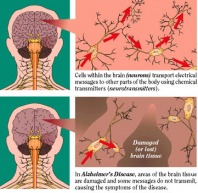AMYLOID DISEASE
A disease characterised by the deposition of amyloid in various organs of the body. It is generally considered that the amyloidoses share common pathogenic mechanisms which lead to protein fibril formation and deposition. These mechanisms may include structural, metabolic, genetic and environmental factors that may be common to all forms of amyloidosis. Primary amyloidosis, while the most common form of amyloidosis, is a sporadic disease and, therefore, can only be investigated on a case by case basis. Secondary (reactive) amyloidosis occurs in subjects with chronic inflammatory disease or cancer but factors which predict amyloid formation and which subject is going to be affected, are not readily apparent. Alzheimer disease, while very common in the aged population, is unpredictable except for those rare forms of familial Alzheimer disease with characterized mutations in specific genes. Hereditary transthyretin amyloidosis has generally been considered a rare disease and the original impetus to study the pathogenesis of this disease was because it represented a human model of systemic amyloidosis.
ALZHEIMERS DISEASE

Alzheimer disease or simply Alzheimer's, is the most common cause of dementia, afflicting 24 million people worldwide. Alzheimer's is a degenerative and terminal disease for which there is currently no known cure. In its most common form, it occurs in people over 65 years old although a less-prevalent early-onset form also exists. The disease can begin many years before it is eventually diagnosed. In its early stages, short-term memory loss is the most common symptom, often initially thought to be caused by aging or stress by the sufferer.Later symptoms include confusion, anger, mood swings, language breakdown, long-term memory loss, and the general withdrawal of the sufferer as his or her senses decline.Gradually the sufferer loses minor, and then major bodily functions, until death occurs. Although the symptoms are common, each individual experiences the symptoms in unique ways.The duration of the disease is estimated as being between 5 and 20 years. The symptoms of Alzheimer's disease are generally reported to a physician when memory-loss causes concern, and on suspecting Alzheimer’s disease, the physician or healthcare specialists will confirm the diagnosis with a behavioral assessment and cognitive tests, often followed by a brain scan.
The cause and progression of Alzheimer's disease is not well understood, but is associated with plaques and tangles in the brain. Possible causes and potential cures of the disease have been conjectured, with varying evidence supporting each claim. No treatment has been found to stop or reverse the disease, and it is not known whether current treatments slow the progression, or simply manage the symptoms. Many preventative measures have been suggested for Alzheimer's disease, but their value is unproven in reducing the course and severity of the disease. Mental stimulation, exercise and a balanced diet are often recommended, both as a possible prevention and as a sensible way of managing the disease.
Due to the incurable and degenerative nature of the disease, care-management of Alzheimer's is essential. The role of the main caregiver is often taken by the spouse or a close relative.Caregivers may themselves suffer from stress, over-work, depression, and being physically hit or struck.
